|
|
|
Sort Order |
|
|
|
Items / Page
|
|
|
|
|
|
|
| Srl | Item |
| 1 |
ID:
080173


|
|
|
|
|
| Publication |
2007.
|
| Summary/Abstract |
Despite substantial evidence that international trade has promoted peace in the post-World War II era, the commercial peace research program still faces an important historical challenge. Dramatic economic integration in the nineteenth century failed to prevent the increasing interstate hostilities that culminated in the outbreak of war in 1914. This article uses a theoretical revision grounded in standard trade theory to reexamine the relationship between commerce and peace in the fifty years before World War I, a period often referred to as the first era of globalization. The article focuses on domestic conflict over commercial policy rather than on interdependence to understand the conditions under which globalization promotes peace. In a sample dating from 1865 to 1914, the authors find that lower regulatory barriers to commerce reduce participation in militarized interstate disputes. Contradicting conventional wisdom, this evidence affirms a basic premise of commercial liberalism during the first era of globalization-free trade promotes peace
|
|
|
|
|
|
|
|
|
|
|
|
|
|
|
|
| 2 |
ID:
147639


|
|
|
|
|
| Summary/Abstract |
As part of its economic diplomacy, Australia has directed intense effort into both bilateral and plurilateral trade negotiations such as the Trans-Pacific Partnership. According to then Minister for Trade and Investment Andrew Robb, with no major multilateral trade deal in decades, you have to ‘row your own boat’ or risk missing out. With the fundamentals of trade and the nature of trade negotiations changing, trade liberalisation has become an increasingly sophisticated and difficult negotiating area. A case study of the controversial TPP shows the tensions for a middle power navigating this space. The benefits of the TPP are contested and the government faces criticism of the adverse impacts of the agreement, especially investor-state dispute settlement clauses, impact on human rights and suspicion that the TPP is motivated by geopolitical drivers. In order not to lose more than it gains in moving away from the multilateral trade system, Australia must ensure that trade agreements are consistent with WTO rules and have open and fair accession regimes as a basis for signing. Finally, there is the need for higher levels of transparency and democratic accountability than has historically applied. A new white paper is necessary to make the case for trade liberalisation.
|
|
|
|
|
|
|
|
|
|
|
|
|
|
|
|
| 3 |
ID:
111973


|
|
|
|
|
| Publication |
2012.
|
| Summary/Abstract |
This article argues that neo-Gramscian theorizations of "hegemony" have failed to illuminate the role of nineteenth-century Britain in the rise of a liberal world economy in three respects. First, they have provided mutually exclusive accounts of the social forces underpinning domestic and international hegemony. Second, they have failed to show Britain's agency in the making of a liberal world order. Third, they have posited a uniformity of social forces and liberal state forms that elides the differences between British and continental societies, thereby obscuring the real reasons for the general shift to liberal internationalism. We argue that it was the structural differences in the economic, social, and political organization of Britain and continental Europe that made free trade without a hegemon possible. Neo-Gramscian theorists of hegemony-just like their mainstream peers-have unduly generalized from the unique structures of American hegemony after 1945. Instead of serving as a master concept to organize the history of international relations, hegemony itself needs to be historicized: as a singular and temporally limited possibility of societal and international rule, preceded and succeeded by other forms.
|
|
|
|
|
|
|
|
|
|
|
|
|
|
|
|
| 4 |
ID:
104756
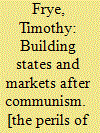

|
|
|
|
|
| Publication |
Cambridge, Cambridge University Press, 2010.
|
| Description |
ix, 296p.
|
| Series |
Cambridge studies in comparative politics
|
| Standard Number |
9780521734622
|
|
|
|
|
|
|
|
|
|
|
|
Copies: C:1/I:0,R:0,Q:0
Circulation
| Accession# | Call# | Current Location | Status | Policy | Location |
| 056009 | 338.947/FRY 056009 | Main | On Shelf | General | |
|
|
|
|
| 5 |
ID:
099189


|
|
|
| 6 |
ID:
152502
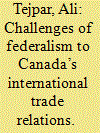

|
|
|
|
|
| Summary/Abstract |
As one of the first “second-generation” free trade agreements that address indirect and non-tariff barriers, the Canada–European Union Comprehensive Economic and Trade Agreement (CETA) is likely to serve as an international model. CETA, however, highlights significant challenges for Canadian federalism in both the negotiation and implementation processes of this and any such future trade agreements. While the inclusion of sub-federal governments allows for provinces/territories to help shape the provisions that fall within their jurisdictions, this paper argues that subsequent challenges arise in conveying a unified Canadian commitment to implement the agreement. Overall, the CETA negotiations demonstrated the significant institutional weaknesses of current federal–provincial/territorial relations with respect to international trade agreements. In the Canadian context, this suggests a need for “summit federalism” to ensure that all federal–provincial/territorial governments align their terms and interests and convey a unified commitment to fulfilling Canada’s current and future international trade agreements.
|
|
|
|
|
|
|
|
|
|
|
|
|
|
|
|
| 7 |
ID:
173300


|
|
|
|
|
| Summary/Abstract |
TWELVE COUNTRIES. Roughly 40% of global GDP. One-third of world trade. More than five years of talks, 30 topics of negotiation and 6,000 pages of text. All of this went into the Trans-Pacific Partnership Treaty, a free trade agreement (FTA) that was one of the world's most ambitious economic projects but never came into force. It was an accord of a new type that stated a new perception of trade, was to be a major step in its liberalization, and reflected all key international trends from e-commerce to gender equality.
|
|
|
|
|
|
|
|
|
|
|
|
|
|
|
|
| 8 |
ID:
105397
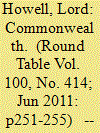

|
|
|
|
|
| Publication |
2011.
|
| Summary/Abstract |
This article, based on a lecture delivered in London, sets out why the Commonwealth is important and why it is ideally placed as a network for the future, with a unique role in the 21st century. It argues that the Commonwealth is the 'world's best soft power network'. The author sets out how the Coalition government in Britain, headed by Prime Minister David Cameron, is actively upgrading its engagement with the Commonwealth and how it is committed to putting the 'C' back into the Foreign and Commonwealth Office. The article also outlines the UK's hopes for the work of the Eminent Persons' Group, the Commonwealth Ministerial Action Group and the Perth Commonwealth Heads of Government Meeting.
|
|
|
|
|
|
|
|
|
|
|
|
|
|
|
|
| 9 |
ID:
145602
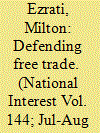

|
|
|
|
|
| Summary/Abstract |
THE NEED to fight protectionism may well stand as one of America’s clearest and most vital national interests. From the voting booth to the country’s foreign-policy establishment, action is needed to defend free trade and shift away from past, unnecessarily partisan trade policies. Protectionism has destroyed prosperity time and again. The most dramatic illustration emerges from the history of the Smoot-Hawley tariffs of the 1930s. Sen. Reed Smoot and Rep.
|
|
|
|
|
|
|
|
|
|
|
|
|
|
|
|
| 10 |
ID:
056709


|
|
|
| 11 |
ID:
134213


|
|
|
|
|
| Publication |
2014.
|
| Summary/Abstract |
The paper provides an overview of the most important results of a project on EU-Korea economic and regulatory relations funded by the European Commission. The paper first outlines the emergence and development of EU-Korea relations. In the second part, the paper presents the main findings clustered in three thematic areas. A first thematic area focuses on a discussion of the EU-Korea Free Trade Agreement. The second cluster analyzes EU-Korea cooperation on regulatory policies with a main focus on cooperation in the policy areas of security (arms trade and control), chemical regulation, environmental regulation, education, development cooperation and industrial policy. The third part focuses on EU-Korea cooperation concerning regional and international issues. In the third part, the paper presents the main recommendations which were formulated on the basis of the project
|
|
|
|
|
|
|
|
|
|
|
|
|
|
|
|
| 12 |
ID:
082349
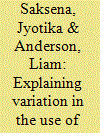

|
|
|
|
|
| Publication |
2008.
|
| Summary/Abstract |
Despite the much-touted celebration of the successes of the General Agreement on Tariffs and Trade/World Trade Organization in liberalizing free trade, these successes have been limited due to the increasing use of non-tariff barriers (NTBs) as a form of 'protectionism in disguise.' Among advanced industrial economies, the use of NTBs varies considerably. The purpose of this paper is to explain what accounts for this variation. We locate the issue of international trade in its appropriate theoretical context - as a two-level game in which politicians simultaneously face pressure at the international level to fulfill commitments to international free trade agreements, and domestic pressures for protectionist relief. We conduct a statistical analysis using a simple, multivariate regression model examining data at three points in time, 1988, 1993, and1996, to highlight the causes of the rise in NTBs and variation in their usage. We hypothesize that PR-based systems are associated with lower rather than higher levels of NTBs
|
|
|
|
|
|
|
|
|
|
|
|
|
|
|
|
| 13 |
ID:
082068
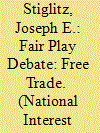

|
|
|
| 14 |
ID:
149176


|
|
|
|
|
| Summary/Abstract |
Why does Canada lack the closeness of economic ties with China enjoyed by other developed Commonwealth countries, such as New Zealand? While these countries take similar positions toward China with regard to human rights and security-related matters, they differ markedly in terms of trade relations—New Zealand inked a free trade deal with Beijing in 2008, while such an agreement between Canada and China has remained out of reach. This article probes the source of this divergence. The answer, it is argued, lies in the sociotropic effects of political opposition groups on both the left and the right in Canada, and the absence of parallel conditions in New Zealand.
|
|
|
|
|
|
|
|
|
|
|
|
|
|
|
|
| 15 |
ID:
064717


|
|
|
|
|
| Publication |
Winter/Spring 2004.
|
|
|
|
|
|
|
|
|
|
|
|
|
|
|
|
| 16 |
ID:
143197
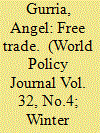

|
|
|
|
|
| Summary/Abstract |
As secretary-general of the Organization for Economic Cooperation and Development, Ángel Gurría directs efforts to fight corruption. World Policy Journal sits down with Gurría to discuss the importance of transparency in Latin America.
|
|
|
|
|
|
|
|
|
|
|
|
|
|
|
|
| 17 |
ID:
094989
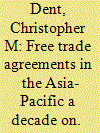

|
|
|
|
|
| Publication |
2010.
|
| Summary/Abstract |
This paper charts the growth and patterns of free trade agreement (FTA) activity in the Asia-Pacific, discussing the extent to which there has been evolution and learning in FTA practice among Asia-Pacific states, with attention to the most notable trends in technical policy content and the different ideational approaches to formulating agreements. This sets the broad context for considerations of the current and likely future paths of FTA convergence, harmonization, and transformation in the Asia-Pacific. It is argued that new options for economically rational and politically feasible bilateral FTA partnerships within the Asia-Pacific region are running out. One response has been to explore more seriously options for forming wider plurilateral and regional agreements within the Asia-Pacific. However, a number of constraints and hindrances will work against such FTA convergence and harmonization. The longer term transformation of existing, mostly bilateral FTAs into different or expanded types of agreement has stronger prospects.
|
|
|
|
|
|
|
|
|
|
|
|
|
|
|
|
| 18 |
ID:
113380
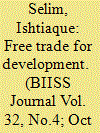

|
|
|
|
|
| Publication |
2011.
|
| Summary/Abstract |
Over the years, free trade has been an issue of great debate. The present paper tries to examine whether free trade is conducive for the development of the developing nations. Instead of focusing on the rhetoric attached to free trade, it makes an attempt to look into the flaws in comparative advantage theory, which is a theoretical foundation of free trade. A considerable part of the paper is devoted to analyse some concerning facts related to free trade. The paper concludes that protectionism along with some appropriate government policies should be the way forward for the developing economies before their industries are exposed to free trade regime.
|
|
|
|
|
|
|
|
|
|
|
|
|
|
|
|
| 19 |
ID:
109513


|
|
|
| 20 |
ID:
145803


|
|
|
|
|
| Summary/Abstract |
This article examines an important source of social unrest in Ottoman ports where ships could not be tied directly to the quays. In such places, boatmen ferried goods and passengers between the shore and ships that anchored offshore. Many of these boatmen wanted to work on the queue system because it provided work and income security to them. However, merchants and a few boatmen viewed this system as a major obstacle for their business to survive and grow. The Ottoman government also took part in this debate. However, rather than acting as a unitary actor, various components of the government adopted different positions on the issue. In the early twentieth century, these actors with different views and goals were involved in a series of conflicts. These conflicts forced Ottoman ruling elites to change their policies about the boat queue system several times at least but did not result in a decisive victory for one side or the other.
|
|
|
|
|
|
|
|
|
|
|
|
|
|
|
|
|
|
|
|
|